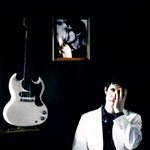Edgard Varèse once said, "I refuse to submit to sounds that have already been heard." Asserted early in his musical career, this bold statement anticipates the narrative of Varèse's musical life, eleven words that would come to haunt and drive his musical ambitions. The musical world, however, was not ready for such iconoclastic ambition. In 1923, Varèse wrote "Hyperprism," a daring composition making use of new musical instruments with an emphasis on percussion -- it caused a riot. Years later, Varèse wrote "Ionisation," another percussion-heavy composition declaring to the world the siren is just as viable a musical instrument as the piano.
Varèse eventually began yearning for more and announced this desire in written-form with his manifesto, "The Liberation of Sound." In the manifesto, Varèse dreamt of "liberation from the arbitrary paralyzing tempered system." Demanding an unlimited palette of sounds, infinite numbers of scales, high and low registers virtually impossible to attain, he believed composers were still "obsessed" by traditions only serving to limit the composer. In short, Varèse wanted something technology at the time could not provide him.
Throughout the rest of his life, Varèse would pursue sounds he felt were indicative of liberation. It was not until the age of 71 (after a period of stagnation in composing and failed attempts at setting up an electronic music research lab with Bell Telephone) that Varèse really began to get the ball rolling, mainly due to technological advancements occurring in France and Germany around WWII, specifically, the magnetic tape. After composing a collage of taped sounds called "Déserts" (which, like past work, produced an angry reaction at its premiere), Varèse finally had technology that could generate the sounds he sought and allowed him to write his masterpiece: "Poème électronique."
Unlike earlier compositions mentioned, "Poème électronique" is entirely electronic. Starting with a sonic explosion, the track continues arrhythmically and atonally, using various sound textures and sound sources. Varèse masterfully blends electronically-generated sounds and pre-recorded noise from real life (singing, trains, snare drum, etc), superimposing disparate elements that confound rather than comfort, creating a dizzying, ambiguous array of noises exploring stark dynamic shifts and defying expectations. The listener is unable to predict any element of the music and fails to reach an emotional connection with its emphasis on atonality and unpredictability.
The music alone isn't enough to fully appreciate its significance in the history of music. Written for a 1958 exhibition at the Brussels World Fair, "Poème électronique" not only eschews tonality, harmony, and melody (a battle fought by early modernists, such as Schoenberg and Webern), but also deconstructs rhythm and sonority, elements that the second phase of modernists fought against. The result is a complete annihilation of the traditional forms he attacked early on with his precocious manifesto. Like the Abstract Expressionists in visual art, Varèse abstracted music in a manner resulting in a whole new level of communication, mounting a battle against all previous musical forms and musical archetypes with the nearly limitless possibilities of electronically-generated music.
Sadly, Varèse's "Poème électronique" turned out to be his swan song. Although he intended to "make up for lost time" with the recent technological advancements, Varèse died on November 6th, 1965. Luckily Varèse's work was given much needed reappraisal in 1998, when London released Edgard Varèse: The Complete Works. Performed by the Royal Concertgebouw Orchestra, the Asko Ensemble, and director Riccardo Chailly, and assembled with the assistance of Chou Wen-Chung (who worked with Varèse), Varèse's complete discography fits wonderfully on two quality discs. Anyone interested in modern electronic music would be hard pressed not to seek out this release. Edgard Varèse is the undisputed father of electronic music, and it's about time everyone found out why.
